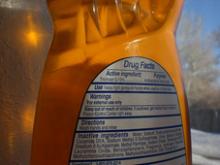The most frustrating aspect of triclosan's ubiquity is that it is useless. It has little to no impact on germs in the (very weak) concentrations you find in over the counter liquid soaps.
And there is little need for an antibiotic in hand soap anyway; the mechanical action of washing your hands, combined with the surfactant (making things not stick to each other) action of the soap itself is what does the trick.
I became concerned about triclosan when I moved to a home with a septic system. You don't want to pour antibacterial substances down your drain, when bacteria are what eat your poop! (I eventually went to good old Dr. Bronner's liquid soap, diluted 50/50 with tap water, in a ketchup style squeeze bottle.)
According to the FDA, as quoted here in the Wikipedia article, "there is no evidence […] that triclosan provides an extra benefit to health in other consumer products." It's true that a 2% concentration of triclosan in soap is effective against bacteria like MRSA. But over the counter soaps (the kind we buy at the grocery store without a prescription [!!]) have a concentration between .10% and .25%. Far too weak to do any good.
The overuse of triclosan can also contribute to the formation of resistant germs. Ages ago I was told that this couldn't happen, because "triclosan isn't a real antibiotic like penicillin - it's like bleach." This turns out not to be the case.
Triclosan kills bacteria by binding to an enzyme which bacteria need to absorb fatty acids. However, some bacteria (including strains of staph and e. coli) have become resistant to triclosan binding to their enzymes. Other bacteria like pseudomonas have developed the ability to "pump triclosan out of the cell."
Compounding the evilness, when exposed to sunlight triclosan degrades into dioxins. Not all dioxins are toxic, although many are. The jury is still out on which dioxins triclosan turns into, and how dangerous they are. But this is a serious cause for concern, because dioxins don't tend to break down. Instead, they stay in your system for a very long time. The effect of dioxin exposure is cumulative.
As to the endocrine disruptor effects, so far these have only been observed in animal subjects - frogs, rats, fish, and so forth. But there is no reason to assume that triclosan doesn't disrupt the endocrine systems of humans, and once again, its ubiquity raises this to a higher level of concern. Triclosan acts to block thyroid hormones, which can throw your entire system out of whack.
Long story short, even if the EPA decides not to ban triclosan (which would be thanks largely to corporate lobbying, mark my words), it is a substance which is best avoided.
Anything labeled "antibacterial" probably contains triclosan - but to be sure, check the "Active Ingredients" list on the label. Instead of triclosan, use regular soap (another plug for Dr. Bronner's!), and alcohol-based hand sanitizers. And check your toothpaste, because triclosan is often included as an anti-gingivitis measure. (Flossing prevents gingivitis better than triclosan ever could!)
Photo credit: Flickr/Jack Black's Stunt Double
